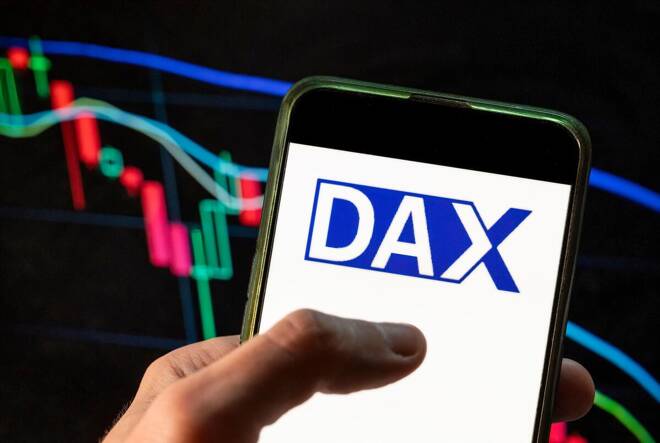Advertisement
Advertisement
DAX Index: German Producer Prices, Car Registrations, and the Middle East in Focus
By:
The DAX 30 is set for a fall at the European opening bell. Risk aversion continues to impact the markets, with the Middle East conflict a focal point.
Highlights
- The DAX fell by 0.33% on Thursday, ending the day at 15,045.
- Rising US 10-year Treasury yields, disappointing corporate earnings, and the Middle East conflict led the DAX below 15,000 before a partial recovery.
- German producer prices, the Fed, and the Middle East conflict need consideration on Friday.
DAX Thursday Overview
On Thursday, the DAX fell by 0.33%. Following a 1.03% slide on Wednesday, the DAX ended the day at 15,045.
Corporate Earnings and Bond Yields Left the DAX in the Red
Corporate earnings, the Middle East conflict, and uncertainty toward monetary policy weighed on riskier assets.
US jobless claims signaled a tighter US labor market. Tight labor market conditions support a more hawkish Fed interest rate trajectory to curb wage growth and spending. Dovish Fed chatter has eased bets on a Fed rate hike. However, the Fed is signaling a higher-for-longer rate path to tackle inflation.
10-year US Treasuries rose to 4.996% on Thursday, impacting the equity markets. Fed Chair Powell spoke after the European closing bell but failed to support the appetite for US-listed stocks.
The Dow and the S&P 500 fell by 0.75% and 0.86%. The Nasdaq Composite Index declined by 0.96%
The Thursday Market Movers
The continued uptrend in US Treasury yields weighed on tech stocks. Infineon tech was among the worst performers, sliding by 3.39%.
Auto stocks also suffered heavy losses as investors reacted to disappointing earnings from Renault. Continental tumbled by 4.45%, with BMW sliding by 2.66%. Volkswagen and Daimler Truck Holding saw losses of 2.16% and 2.13%. Porsche and Mercedes Benz Group ended the session down 1.23% and 1.14%.
However, SAP rallied 5.07% on the Q3 earnings beat.
Friday Focus: German PPI Numbers and the Middle East
German producer prices will draw investor interest on Friday. Economists forecast producer prices to increase by 0.4% in September (Aug: +0.3%). However, economists predict producer prices to decline by 14.2% year-over-year (Aug: -12.6%). An unexpected monthly fall in producer prices would fuel fears about a German recession. A fall in producer prices would reflect a weak demand environment.
German car registration numbers also warrant consideration. Another rise in registrations may signal an improving consumer sentiment trend.
Away from the numbers, ECB Executive Board member Elizabeth McCaul is on the calendar to speak on Friday. Support for further interest rate hikes would test the buyer appetite for DAX-listed stocks.
However, investors must monitor news updates from the Middle East. An escalation in the conflict would affect market risk appetite.
Fed Speakers to Wrap Up a Busy Week
FOMC commentary warrants consideration on Friday. FOMC member Patrick Harker is on the calendar to speak. A dovish outlook on interest rates would support the appetite for riskier assets. This week, Patrick Harker favored a hold on interest rates, suggesting similar guidance.
FOMC member Loretta Mester will speak after the European closing bell.
The futures markets point to a testy Friday session. The DAX and the Nasdaq mini were down 77 and 43 points, respectively.
Short-Term Forecast
German recession jitters and Fed policy uncertainty remain headwinds for the DAX. The Middle East conflict and the threat of other nations joining the conflict add to the negative bias for riskier assets. The market mood exposes the DAX to disappointing corporate earnings and sub-15,000.
DAX Technical Indicators
Daily Chart
The DAX sat below the 50-day and 200-day EMAs, affirming bearish price signals.
A drop below 15,000 would support a move toward the 14,814 support level. Weak German producer prices, corporate earnings, and the Middle East conflict remain focal points. A break above the 15,058 resistance level would support a move toward the 15,245 resistance level.
A de-escalation in the Middle East conflict and better-than-expected corporate earnings would support a positive session.
The 14-day RSI reading of 37.77 suggests a DAX drop below 15,000 before entering oversold territory.
4-Hourly Chart
The DAX rests below the 50-day and 200-day EMAs, reaffirming bearish price signals. A DAX above the 15,058 resistance level would support a move toward the 15,245 resistance level and 50-day EMA.
However, a fall below 15,000 would give the bears a run at the 14,814 support level.
The 36.00 14-4 hour RSI reading suggests a DAX fall below 15,000 before entering oversold territory.
For a look at the economic events, check out our economic calendar.
About the Author
Bob Masonauthor
With over 28 years of experience in the financial industry, Bob has worked with various global rating agencies and multinational banks. Currently he is covering currencies, commodities, alternative asset classes and global equities, focusing mostly on European and Asian markets.
Advertisement
